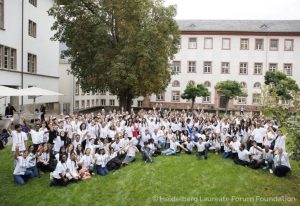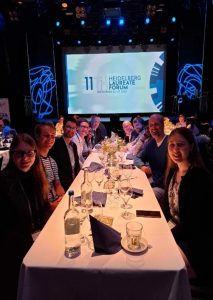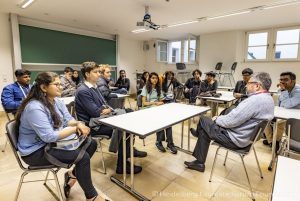Joshua Peters
University of Queensland
11th Heidelberg Laureate Forum Report
The 11th Heidelberg Laureate Forum (HLF) took place from September 22 to 27, 2024, bringing together 200 selected young researchers from around the world and recipients of the most prestigious awards in mathematics and computer science, including the Abel Prize, ACM A.M. Turing Award, ACM Prize in Computing, Fields Medal, IMU Abacus Medal, and Nevanlinna Prize. I was fortunate enough to attend and am excited to share my experience.
Figure 1: 11th HLF Group Photo
Each day was packed with a mixture of lectures, panel discussions, workshops, and most importantly, coffee breaks. I’m not kidding! During the opening ceremony, it was stressed that networking is one of the main focuses of the forum. After all, it’s not often you find yourself in a room with 200 like-minded young researchers from over 50 different countries. The diversity at HLF made every conversation engaging, with each individual bringing a unique background and passion for their research.
Figure 2: Boat Trip
Evenings featured memorable activities, from boat trips to dinners in a castle. These are experiences that I’ll treasure for the rest of my life. Having the opportunity to ask the laureates questions and listen to their wisdom was invaluable. Many of these meaningful discussions happened during these social activities, where the laureates shared both research-related insights and life advice.
If I had to pick a highlight from the forum, it would have to be the panel discussion titled The Paradox of Artificial Intelligence. Here, the panel explored how AI is shaping education, the differences between how humans and machines learn, and what we can learn from each other. The experts’ diverse perspectives made this a fascinating discussion. A close second for me was the lecture by Alexei Efros, recipient of the ACM Prize in Computing (2016), where he emphasized the importance of data in the modern age, especially in relation to AI.
Figure 3: Dinner with Sir Martin Hairer (2014 Fields Medallist)
Whether you’re an undergraduate student or a post-doc, I highly recommend applying to attend the HLF. I’m extremely grateful to AMSI and AustMS, whose HLF Travel Fund made it possible for me to attend.
Where am I in my career?
I’m a second-year maths PhD student at the University of Queensland.
Why did I want to attend the HLF?
The HLF serves as a platform for students in mathematics and computer science to engage with the brightest minds of this generation. This alone motivated me to apply. I was eager to interact with the laureates and learn from their experiences, an opportunity that’s hard to find elsewhere. Additionally, with over 50 countries represented at the event, it was a fantastic way to explore how my research could be applied across different areas of mathematics and computer science, while also building a network with peers worldwide.
Tell us about your research:
My current research investigates chaotic dynamical systems subject to random external forcing, particularly focusing on metastable systems, a class of dynamical systems with more than one state of apparent equilibrium. We study the statistical properties of these systems, including the existence of stationary states and limit theorems.
What is your favourite application of your work?
Metastable systems are used to study slow-mixing regions of the ocean, known as gyres, which contribute to phenomena such as the Great Pacific Garbage Patch. In this context, random metastable systems emerge when ocean currents are influenced by external forces, such as changing wind patterns.
If I could meet any Fields Medallist or Abel Prize winner, who would it be and why?
Terence Tao. I’d love the opportunity to speak with one of the greatest mathematicians of this generation. Terence has an elegant way of communicating his research, and I believe I could learn a lot from him. Plus, he’s Australian!
Figure 4: Small Group Interaction with Efim Zelmanov (1994 Fields Medallist)




